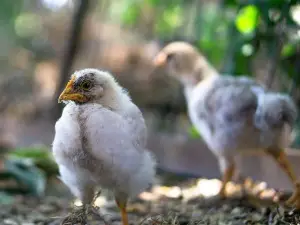
If you listen closely you’ll hear the differences in how baby chicks communicate to each other. Knowing how to tell the difference between each call can be a big help to you
This article looks into the different distress calls that your chicks may make
Table of Contents
Baby chick distress call:
The fact that chicks can’t speak like humans doesn’t mean that these birds don’t have a big vocabulary, they do, and they have a variety of ways to express their distress.
Here are a few baby chick distress calls that you should listen out for:
Distress because of fear:
Chicks know that they are quite low on the food chain and almost anything will scare them.
A scared bird may make quick and repetitive cheeping sounds and then go on to make loud screeching or screaming sounds if a predator gets too close.
The bird may also scream or screech if they are woken up by sudden bright lights, or a predator, at night
What to do:
If your bird is scared of a predator then you would need to remove the predator from the area as quickly as you can. The predator may be a new person or your domestic pets.
Calm the bird down by holding it close to you and speaking softly to it. You can also give the bird treats to make it feel better.
If the bird is awoken by bright lights at night then you can install blackout curtains in your bird’s room to keep light from outside from getting into your bird’s room.
You can also leave a dim light in your bird’s room for when it wakes up in the middle of the night. Seeing that there is no threat in the room at night will be reassuring to the bird.
New environment:
Your bird’s environment could lack something and the bird may start to make distress sounds to get your attention so you can fix it
Your birds may chirp loudly if they are feeling too hot under a heat lamp, the birds may also huddle together if they are too cold.
Your birds may also chirp loudly if they are hungry and there is nothing for them to eat and they will also chirp if they are thirsty.
What to do:
You’d need to figure out the reason why your bird is chirping loudly and tend to the bird.
If the birds are cold then increase the temperature of the heat lamp and if the birds are hungry or thirsty then give them food and water.
Distress because you aren’t around:
Your bird may also make distress calls when you aren’t around, these calls will sound just as the above distress sound but will only stop once the bird is picked up by you.
The birds who do this may have imprinted in you, this means they now see you as their mother. They will make these calls because they want to be around you.
What to do:
This is concerning as the birds will not only want to be around you, they will also learn how to live and act from how you live and act.
This is not good as they should be learning how to live and act from their real mother and the members of the flock.
If you think that this is what is happening then you should leave the bird with members of their flock so they can learn how to be a chicken.
Start doing this for short periods of time and then extend how long you leave the baby bird in the flock for once the bird is more comfortable with its flock mates
If you enjoyed this article then you may also be interested in other bird related articles. Here are some articles that you may be interested in: Baby Chick Wants To Be Held All The Time, Baby Chick Looks Wet, White Spots On Cockatiel Beak, Baby Chick Screaming, Chicken Stuck On Back, Red Rash On Chickens Skin, Chickens With Red Skin, Baby Chick Laying Down With Wing Out, Baby Chick Won’t Walk Or Open Eyes?


